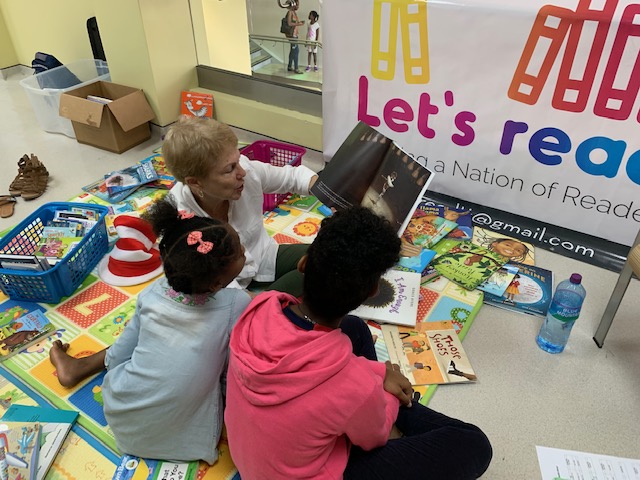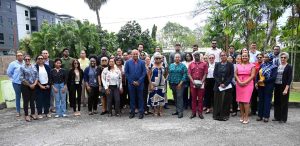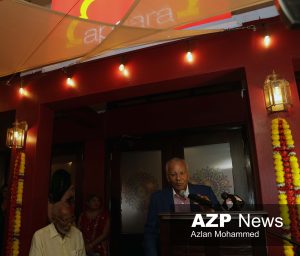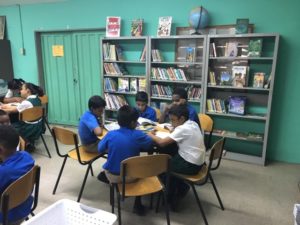
By Alicia Chamely
LET’S READ is embarking upon what may seem to most people as an impossible task; in the time of tablets, smart phones and host of other devices aimed at instant gratification, this band of educators is reigniting the love of reading in Trinidad and Tobago.
It is no easy chore, as reading is seen as more of a task than a source of enjoyment, but for the women at Let’s Read it’s a challenge they have accepted and have been succeeding at since 2010.
Founded in 2010 by Suzette Cadiz and Marcia Steinberg, Let’s Read aims to promote early literacy through the joy of reading and the facilitation of easy access to books. In 2012 Alison De La Bastide joined the organisation and in 2017 they gained NGO status. With over 20 years of teaching experience among them, they embarked on a journey to improve literacy and create a generation of young readers.
So how do you take a nation of non-readers and make them fall in love with reading? Let’s Read believes if from a young age you provide children with access to books and teach them that reading is more than “studying” but as way to empower them, you can create the cultural shift needed.
Let’s Read does this through the creation and refurbishment of libraries across TT. It’s a daunting task, but one they do with care and passion. The first libraries refurbished by Let’s Read were at the Enterprise Government Primary School and the Endeavour Hindu Primary School.
According to Cadiz, it all started with either refurbishing or creating a space in a school for a library. She said they go in, clean, sort existing books, add new and used contemporary book; establish a library inventory system and train teachers and school on-the-job-trainees (OJTs) to use this system as well as how to encourage reading through the use of the read-aloud practice. All funds needed for these works are raised by Let’s Read or done with corporate partnerships, most recently partnering with Maritime Insurance.
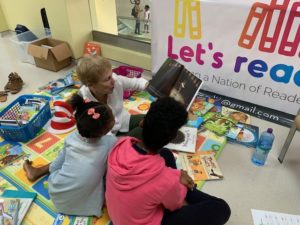
To date they have completed 28 schools and have another 30 in line.
Let’s Read Director De La Bastide explained when Let’s Read first started going into schools it became apparent that most students had little or no access to books other than their school text books.
She said as a result reading was associated with being tested and reading essentially developed into a fear.
De La Bastide said the introduction of reading non textbooks aloud to students allows the children to experience reading as enjoyable and that the story in a book can be impactful on their lives, especially those from local or regional authors who share similar experiences.
The practice of reading aloud and encouraging independent reading within in the class room is one that Let’s Read promotes at all schools they become involved with. This allows students to experience books as a form of enjoyment and a tool of education outside of what is taught in the classroom. It is a simple mechanism that helps encourage literacy.
De La Bastide passionately discussed the excitement students have whenever they organize read aloud sessions in schools. She said students from infants all the way to standard five rush the sessions.
Through the establishment of a proper library system, students can take books home with them, allowing them to find the enjoyment in reading and promoting literacy.
Literacy is the key to education. De La Bastide said through literacy children build confidence academically allowing them to succeed in all other subjects, adding that reading story books and engaging in discussion helps create critical thinking.
She highlighted the fact that research has shown a direct correlation between crime and literacy. Unfortunately there is no current data on TT’s literacy rate, an issue Let’s Read was currently working with the Central Statistical Office to address.
If you ever need proof that Let’s Read and their systems of engaging young readers are successful, the one person you need to speak to is Nicole Robley, Principal of Patna River Estate Government Primary School.
When she realised her schools literacy rates were falling, she contacted Let’s Read.
“We had a room, no library. We had earmarked a library to be up and running, but it was proving difficult get done. Sadly literacy was our down fall.”
With the help of Let’s Read, Patna River Estate Government Primary School transformed that room into a fully functioning library and has properly trained teachers in handling the library systems and boosting literacy through the read aloud practice.
She said not only has literacy in her school dramatically improved, but students are now rushing to use the library and reading in their free time.
Robley commended Let’s Read’s inclusion of local authors, saying it was important for students to connect with books that they felt they could relate too. She said she noticed after reading the local authors, the children then ventured on to other books expanding their understanding of the world.
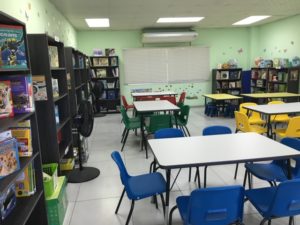
Both Cadiz and De La Bastide believe that education through literacy is our best way forward to creating a better country. Unfortunately the biggest hurdle facing our nation’s children is the lack of access to books.
In 2016 all non-text books were taxed 12.5%, making them out of reach for those who need them the most. Additionally in the national education budget there is no funding for libraries in schools.
This is problem that Let’s Read has begun fighting. Along with other literacy advocacy groups they have begun lobbying the Ministry of Legal Affairs and the Ministry of Finance to have books returned to zero percent VAT. To date neither Ministry has been able to meet with them.
Despite such hurdles, slowly but surely, through advocacy and success stories such as the Patna River Estate Government Primary School, Let’s Read is creating a new generation of readers and helping create a better TT.
To find out more contact or to get involved email them at letsreadtt@gmail.com or visit their Facebook page facebook.com/letsreadtt/
![]()


